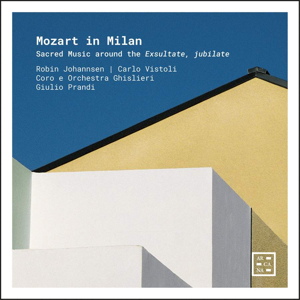
Mozart in Milan: Sacred Music around the Exsultate, jubilate
Johann Christian Bach (1735-1782)
Dixit Dominus in D Major, W E15
Magnificat in C Major, W E22
Wolfgang Amadeus Mozart (1756-1791)
Misericordias Domini, K. 222
Exsultate, jubilate, K. 165
Giovanni Andrea Fioroni (1716-1778)
O sacrum convivium
Melchiorre Chiesa (1740-1799)
Caelo tonanti
Exultavit spiritus meus in Deo (Antiphonam ad Magnificat)
Robin Johannsen (soprano), Carlo Vistoli (alto), Coro e Orchestra Ghislieri/Giulio Prandi
rec. 2022, Gustav Mahler Hall, Kulturzentrum Grand Hotel, Dobbiaco (Bolzano), Italy
Arcana A538 [77]
Mozart in Milan comprises works composed around the time that Mozart was in Milan for his third (and final) sojourn. The seventeen-year-old Mozart wrote Exsultate, jubilate for the soprano castrato Venanzio Rauzzini, who sang the four-movement motet on 17 January 1773 in Sant’Antonio Abate. Soprano Robin Johannsen delivers a moving performance of the original Milan version (Mozart revised the work in 1779 for performances on Trinity Sunday and Christmas in Salzburg). The Coro e Orchestra Ghislieri’s account of Misericordias Domini demonstrates its preeminence in 18th-century Latin choral music.
Two works by Johann Christian Bach, who was Mozart’s mentor during his time in London (1764-1765), reveal his emersion in Roman Catholic theology. The present disc features the world premiere recording of CPE Bach’s Dixit Dominus in D Major from March 1758, which consists of five choruses and four arias. Committed soloists and choir will hopefully garner attention for a work that is overshadowed by settings of the Psalm by Antonio Vivaldi, RV 594 (1725), and George Frideric Handel, HWV 232 (1707). CPE Bach’s ten-minute, meditative choral rendition of Magnificat a 4 (1760) in C Major contrasts with his fahter’s alternations between choruses and arias for soloists (BWV 243a in E-flat Major from 1723 and BWV 243 in D Major from 1733).
The remaining works in this collection by Giovanni Andrea Fioroni and Melchiorre Chiesa, who were active in Milan during Mozart’s three visits to the city, form part of the Exsultate, jubilate’s milieu. Hearing Mozart’s motet in this context provides insight into its genesis as a fruition of the composer’s assimilation of Italian music.
With invigorating performances by the period-instrument orchestra, soloists, and choir, as well as a clear, detailed recording, this album is valuable for listeners interested in Mozart and late-eighteenth-century Latin liturgical music. The booklet includes commentary in English, French, and Italian, as well as the sung texts with trilingual translations.
Daniel Floyd
Help us financially by purchasing from





















